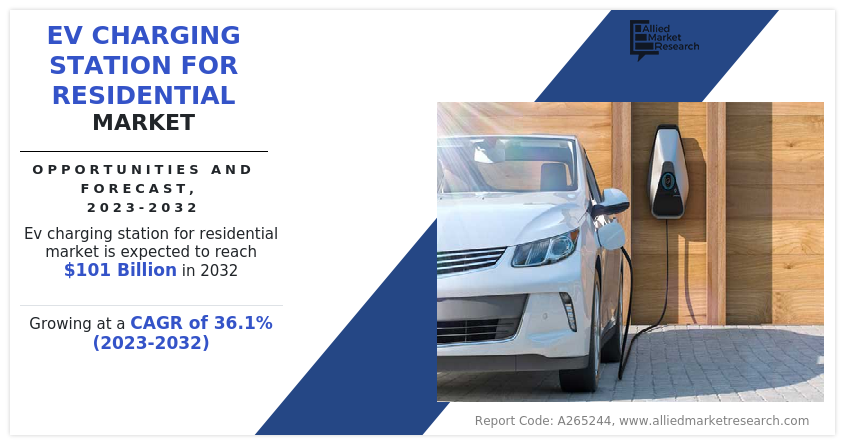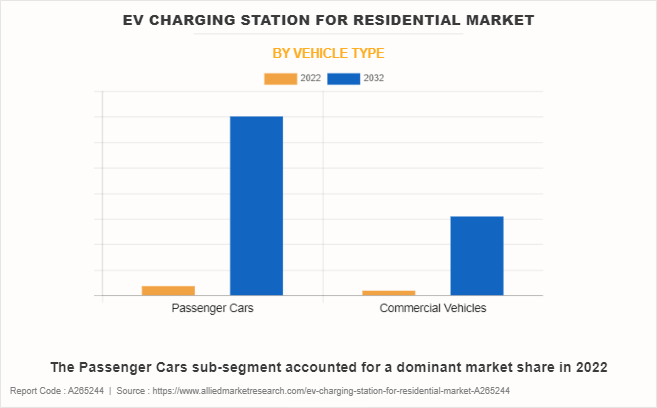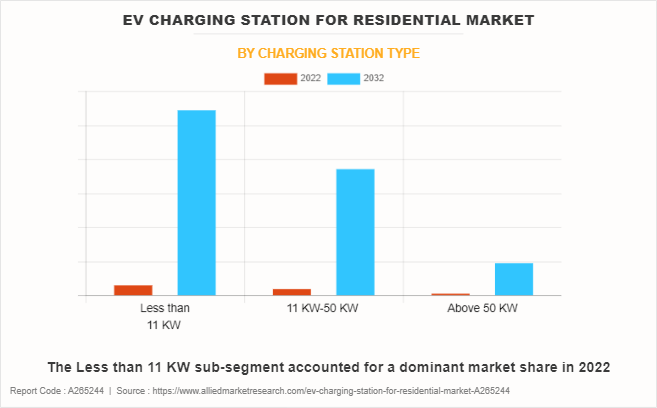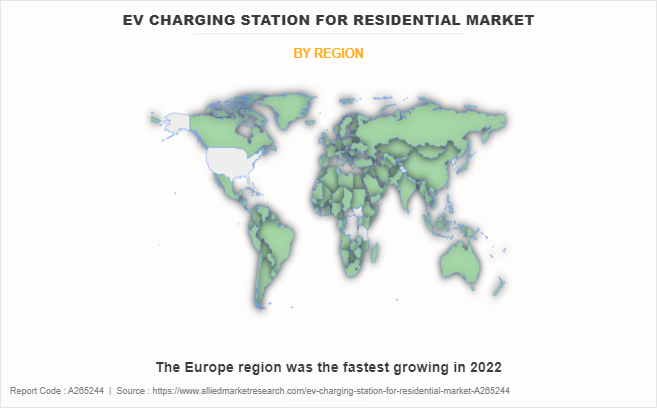Residential EV Charging Station Market Insights, 2032
The global residential EV charging station market size was valued at $5.4 billion in 2022, and is projected to reach $101 billion by 2032, growing at a CAGR of 36.1% from 2023 to 2032.
Residential Electric Vehicle (EV) charging stations have become a critical component of the worldwide shift toward sustainable transportation. As the world fights with the difficulties of climate change and environmental degradation, electric vehicle usage has gained traction. This trend has resulted in an increase in need for easy and accessible charging infrastructure in residential areas. In residential sector, an EV charging station is a specialized facility operational with the required technologies to charge electric vehicles. These charging stations, unlike traditional petrol stations, are particularly suitable for electric vehicles and plug-in hybrids, providing a simple alternative for those who have embraced or are exploring the transition to electric transportation.

Residential EV Charging Stations: Enhancing Convenience and Cost Savings
The convenience that EV charging stations offer to owners of electric vehicles is one of the key benefits of having them in residential areas. Electric vehicle owners appreciate the convenience of charging their vehicles overnight, ensuring that their EVs are completely charged and ready for the day ahead. This reduces the need for households to make frequent journeys to public charging stations, saving time and effort. Furthermore, the ability to charge at home improves the overall accessibility of electric vehicles, making them a more appealing alternative for potential purchasers who may have been prevented by charging infrastructure problems. Economically, the installation of EV charging stations in residential neighborhoods improve property prices.
According to studies, homes with charging infrastructure are considered as more desirable since they meet the rising need for sustainable living alternatives. Due to the worldwide trend towards electric mobility, this extra convenience attracts environmentally conscious homeowners and enhances the perception that the house is future-proof. Another major benefit for those who own electric vehicles is huge cost savings. Charging electric vehicles at home is often less expensive than refueling a regular internal combustion engine vehicle. Furthermore, some electricity companies give specific tariffs or incentives for off-peak charges, encouraging residents to charge during periods of reduced usage. This dynamic pricing method benefits customers while simultaneously making the energy system more efficient.
Challenges in Residential Electric Vehicle Charging Infrastructure Deployment
Slow charging speeds is one of major factors hampering the residential EV charging station market revenue growth. When compared to commercial fast-charging stations, residential charging stations often have lesser power capacity. This implies that charging at home may take longer, reducing the convenience and flexibility of using an electric vehicle, particularly for individuals with longer journeys or hectic schedules. Another cause of concern is the possible pressure on the local power infrastructure. Concentrated charging operations in residential areas, particularly during peak hours, may increase energy demand and, in certain situations, overburden the current infrastructure. Upgrading the system to meet this demand may necessitate significant expenditures and time.
The installation of charging stations frequently necessitates the use of dedicated parking spots that are operational with the necessary equipment. Limited parking spots in highly populated residential areas is projected to impede the broad deployment of EV charging stations. Finding acceptable installation locations while maintaining existing parking spots might be a practical problem. The potential of technical deterioration creates a concern for household charging infrastructure as technology in the field of electric automobiles continues to improve at a rapid pace. Homeowners who invest in charging stations may discover that their equipment is outdated or incompatible with newer vehicles, forcing costly modifications or replacements.
Advancements in Residential EV Charging Infrastructure Enhancing Efficiency, Convenience, and Sustainability
The most recent developments in residential EV charging station market trends are focused on improving efficiency, convenience, and overall user experience. Smart charging technology, which allows customers to remotely monitor and operate their charging stations via mobile applications, is at the forefront. These programs give real-time data on charging progress and energy use, as well as the ability to schedule optimal charging during off-peak hours, which contributes to cost savings and network optimization. Technological developments are critical to capitalizing on prospects in the electric vehicle charging station for residential scenario.
Smart charging solutions, made possible by modern innovations like the Internet of Things (IoT), artificial intelligence (AI), and blockchain, are converting traditional charging stations into intelligent and efficient systems. The increasing use of renewable energy sources also contributes to a positive future development for EV charging station for residential. Users may harvest renewable energy for their automobiles by integrating solar panels and energy storage devices with home charging stations, encouraging sustainability, and lowering reliance on traditional electrical supply.
The key players profiled residential EV charging station industry report include Tata Power, Siemens, ABB, Schneider Electric, Compleo Charging Solutions GmbH & Co. KG, Wallbox, Tesla, ChargePoint, Inc., Eaton Corporation plc, and Leviton. For instance, on April 14, 2023, Schneider Electric, a global leader in the digital transformation of energy management and automation, announced the launch of the EVlink Home charger. The charger incorporates new features aimed at making at-home charging easier to install and more cost-effective to use.
The residential EV charging station market is segmented on the basis of charging station type, vehicle type, and region. By charging station type, the market is divided into less than 11 kW, 11 kW - 50 kW, and above 50 kW. By vehicle type, the market is classified into passenger cars, and commercial vehicles. By region, the market is analyzed across North America, Europe, Asia-Pacific, and LAMEA.
The residential EV charging station market is segmented into Vehicle Type and Charging Station Type.

By vehicle type, the passenger cars sub-segment dominated the global residential EV charging station market share in 2022. Home charging station reduces the need to visit public charging stations, saving time and providing greater scheduling flexibility. Residential charging stations help passenger car owners save money. Home power prices are often cheaper than public charging rates, and users can benefit from lower electricity expenses by charging during off-peak hours. Residential charging allows EV owners to charge their vehicles overnight. This prolonged duration guarantees that the car is completely charged and ready to use each morning, giving you peace of mind and removing the tension associated with locating charging stations during everyday travels.
Residential EV charging stations provide consumers with tailored options. Homeowners may select the appropriate charging equipment for their requirements, whether it is a regular Level 2 charger or a more modern Level 3 charger for faster charging periods. A home charging station improves the entire experience for EV passengers by guaranteeing that their vehicles are charged on a constant basis. This increases the range of electric vehicles and minimizes the risk of range anxiety, making electric vehicles a more practical alternative for daily use.

By charging station type, the less than 11 kW sub-segment dominated the global residential EV charging station market report in 2022. One of the most significant advantages of charging stations with less than 11 kW is their low cost. The charging station and the accompanying electrical infrastructure are often less expensive, making it a more accessible choice for a wider variety of homes. Charging stations with power ratings less than 11 kW are frequently compatible with normal house wiring, eliminating the need for costly electrical improvements. This provides a more efficient and cost-effective installation procedure, making home charging more accessible to a larger range of people. A charging speed of less than 11 kW is ideal for overnight charging, as it corresponds to the average time of an individual night sleep. This slower charging rate is often adequate for everyday commuting needs and guarantees that the EV is completely charged and ready to go by the morning.
Lower power ratings relieve stress on household electrical systems, reducing dangerous overloads and guaranteeing the overall safety of the electrical infrastructure. This allows homeowners to add an EV charging station without having to worry about the capacity of their current electrical infrastructure. Slower charging, such as that offered by charging stations with less than 11 kW, is known to help increase the lifespan of electric car batteries. Slower charging creates less heat, which reduces stress on the battery cells and promotes long-term durability.

By region, Europe dominated the global residential EV charging station market in 2022. Continuous innovations in electric vehicle technology, such as increases in battery capacity, charging speed, and overall performance, have boosted customer confidence in EV adoption. The convenience of owning an electric car becomes increasingly evident as the range of electric vehicles rises and charging times reduce. European and international automakers have been expanding their electric car offerings. The greater availability of multiple EV models that cater to various consumer demands and preferences has been critical in promoting adoption.
Because of this variety, users may discover electric vehicles that suit their lifestyle and needs. To stimulate the use of electric cars, European governments have introduced a variety of incentives and programs. Subsidies, tax breaks, and grants are frequently offered to both consumers and companies to make EVs more affordable. Furthermore, strict pollution restrictions and regulations encourage the switch to cleaner transportation choices, further driving the regional residential EV charging station market growth.
Key Benefits For Stakeholders
- This report provides a quantitative analysis of the market segments, current trends, estimations, and dynamics of the residential EV charging station market analysis from 2022 to 2032 to identify the prevailing market opportunities.
- The market research is offered along with information related to key drivers, restraints, and opportunities.
- Porter's five forces analysis highlights the potency of buyers and suppliers to enable stakeholders make profit-oriented business decisions and strengthen their supplier-buyer network.
- In-depth analysis of the residential EV charging station market segmentation assists to determine the prevailing market opportunities.
- Major countries in each region are mapped according to their revenue contribution to the global market.
- Market player positioning facilitates benchmarking and provides a clear understanding of the present position of the market players.
- The report includes the analysis of the regional as well as global market trends, key players, market segments, application areas, and market growth strategies.
Residential EV Charging Station Market Report Highlights
| Aspects | Details |
| Market Size By 2032 | USD 101 billion |
| Growth Rate | CAGR of 36.1% |
| Forecast period | 2022 - 2032 |
| Report Pages | 310 |
| By Vehicle Type |
|
| By Charging Station Type |
|
| By Region |
|
| Key Market Players | Tata Power, ABB, ChargePoint, Inc., Siemens, Eaton Corporation plc, Wallbox, Leviton, Tesla, Compleo Charging Solutions GmbH & Co. KG, Schneider Electric |
The residential EV charging station market size is expected to grow due to an increase in demand for seamless and accessible charging for electric vehicle globally. In addition, the market is driven by rising adoption of EV vehicles globally.
The major growth strategies adopted by the residential EV charging station market players are product innovation and development of EV charging stations.
Asia-Pacific will provide more business opportunities for the global residential EV charging station market in the future.
Tata Power, Siemens, ABB, Schneider Electric, Compleo Charging Solutions GmbH & Co. KG, Wallbox, Tesla, ChargePoint, Inc., Eaton Corporation plc, and Leviton are the major players in the residential EV charging station market.
The less than 11 kW sub-segment of the charging station type segment acquired the maximum share of the global residential EV charging station market in 2022.
Individual homeowners are the major customers in the global residential EV charging station market.
The report provides an extensive qualitative and quantitative analysis of the current trends and future estimations of the global residential EV charging station market from 2022 to 2032 to determine the prevailing opportunities.
Advancements in battery technology, enhanced user experience among people about the benefits of residential EV charging station market, and surge in demand from wireless charging advancements drive the global residential EV charging station market.
Loading Table Of Content...
Loading Research Methodology...



